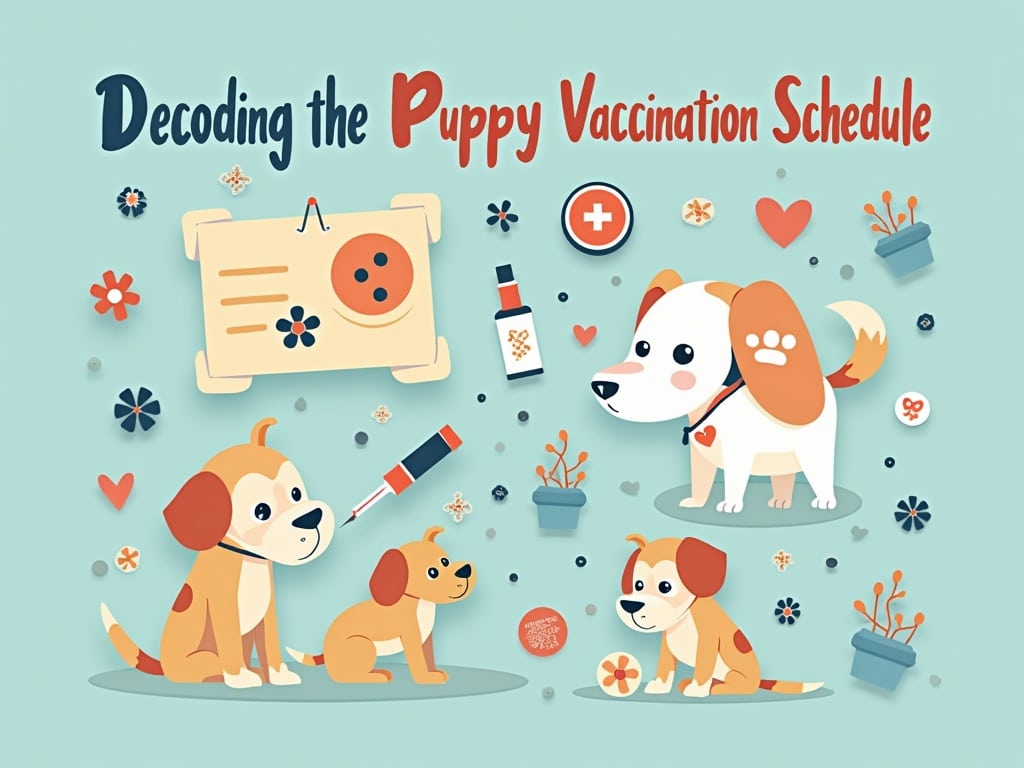Decoding the Puppy Vaccination Schedule: A Vet’s Insider Look
Bringing a new puppy into your life is an incredibly exciting time, filled with cuddles, playful nips, and the promise of unwavering companionship. But amidst the joy and puppy-proofing, there’s a crucial responsibility that every dog owner must embrace: ensuring your furry friend receives the appropriate vaccinations. Navigating the world of puppy vaccinations can feel overwhelming, with confusing terms, varying schedules, and a whole lot of well-intentioned (but sometimes misguided) advice. Fear not! This comprehensive guide, crafted with insights from veterinary professionals, will demystify the puppy vaccination schedule, empowering you to make informed decisions that safeguard your pup’s health and well-being.
Understanding the Importance of Puppy Vaccinations
Imagine your puppy’s immune system as a tiny fortress, still under construction. It’s vulnerable to a host of infectious diseases that can cause serious illness, lifelong complications, or even death. Puppy vaccinations are like reinforcements, providing the blueprints and tools needed to build a strong, resilient defense against these threats. These vaccines work by introducing a weakened or inactive form of a disease-causing agent, stimulating the puppy’s immune system to produce antibodies. These antibodies act as soldiers, ready to recognize and fight off the real disease if the puppy is ever exposed.
Vaccinating your puppy not only protects them individually but also contributes to herd immunity, reducing the overall spread of infectious diseases within the dog population. This is especially important for protecting vulnerable populations like young puppies, senior dogs, and those with compromised immune systems.
Core Puppy Vaccines: What Are They and Why Are They Necessary?
Core vaccines are considered essential for all puppies, regardless of their breed, lifestyle, or geographic location. They protect against diseases that are highly contagious, pose a significant health risk, and are often fatal. Here’s a breakdown of the core puppy vaccines:
- Canine Distemper Virus (CDV): This highly contagious viral disease affects the respiratory, gastrointestinal, and nervous systems. Symptoms can include fever, coughing, vomiting, diarrhea, seizures, and paralysis. Distemper is often fatal, and even puppies who survive can suffer permanent neurological damage.
- Canine Adenovirus (CAV-1 & CAV-2): CAV-1 causes infectious canine hepatitis (ICH), a severe liver disease. CAV-2 causes respiratory disease, including kennel cough. Vaccination against CAV-2 also provides cross-protection against CAV-1.
- Canine Parvovirus (CPV-2): Parvo is a highly contagious and deadly viral disease that primarily affects the gastrointestinal tract. Symptoms include severe vomiting, bloody diarrhea, lethargy, and dehydration. Parvo is particularly dangerous for puppies and can lead to rapid death.
- Rabies: Rabies is a fatal viral disease that affects the central nervous system. It’s transmitted through the saliva of infected animals, typically through a bite. Rabies is a zoonotic disease, meaning it can be transmitted from animals to humans, making vaccination crucial for both your pet’s safety and public health. Rabies vaccination schedules are determined by local and state laws.
Non-Core Puppy Vaccines: Are They Right for Your Dog?
Non-core vaccines are recommended based on a puppy’s individual risk factors, such as lifestyle, geographic location, and exposure to other animals. Discuss these vaccines with your veterinarian to determine if they’re appropriate for your puppy.
- Bordetella bronchiseptica: This bacterium is a common cause of kennel cough, a highly contagious respiratory infection characterized by a harsh, hacking cough. Vaccination is often recommended for puppies who will be frequently exposed to other dogs, such as at boarding kennels, dog parks, or training classes.
- Canine Parainfluenza Virus (CPIV): Another common cause of kennel cough, CPIV is often given in combination with Bordetella.
- Leptospirosis: This bacterial disease is spread through the urine of infected animals, and can cause kidney and liver damage. Leptospirosis is more common in certain geographic areas and in dogs who spend time outdoors, especially near water sources.
- Lyme Disease: Transmitted by ticks, Lyme disease can cause fever, lameness, joint pain, and kidney problems. Vaccination is recommended for dogs living in areas with a high prevalence of Lyme disease.
- Canine Influenza Virus (CIV): This relatively new virus causes a highly contagious respiratory infection similar to the flu in humans. Vaccination is recommended for dogs who are frequently exposed to other dogs, especially in areas where CIV outbreaks have been reported.
The Standard Puppy Vaccination Schedule: A Week-by-Week Breakdown
The puppy vaccination schedule typically starts around 6-8 weeks of age and continues until around 16 weeks of age. This series of vaccinations is necessary because maternal antibodies (antibodies passed from the mother to the puppy) can interfere with the effectiveness of vaccines. The timing of the vaccinations is designed to provide protection as maternal antibody levels decline.
Here’s a general guideline for the puppy vaccination schedule. *Always consult with your veterinarian to create a personalized plan for your puppy.*
- 6-8 Weeks: First DHPP (Distemper, Adenovirus, Parvovirus, Parainfluenza) vaccine.
- 10-12 Weeks: Second DHPP vaccine. Bordetella vaccine (if recommended).
- 14-16 Weeks: Third DHPP vaccine. Rabies vaccine (as required by local laws). Leptospirosis and Lyme disease vaccines (if recommended).
It’s crucial to stick to the schedule recommended by your veterinarian. Delaying or skipping vaccinations can leave your puppy vulnerable to disease.
Potential Side Effects of Puppy Vaccinations: What to Watch Out For
Puppy vaccinations are generally safe, but like any medical procedure, they can sometimes cause side effects. Most side effects are mild and temporary, resolving within a few days. Common side effects include:
- Soreness or swelling at the injection site
- Mild fever
- Lethargy
- Decreased appetite
In rare cases, more serious side effects can occur, such as an allergic reaction (anaphylaxis). Signs of an allergic reaction include:
- Facial swelling
- Hives
- Difficulty breathing
- Vomiting or diarrhea
- Collapse
If you notice any signs of an allergic reaction after your puppy receives a vaccination, seek immediate veterinary attention.
Puppy Vaccination Costs: What to Expect and How to Save Money
The cost of puppy vaccinations can vary depending on your location, the veterinarian you choose, and the specific vaccines your puppy needs. Generally, you can expect to pay between $75 and $200 for the initial series of core vaccinations. Non-core vaccines will add to the cost.

Here are some ways to save money on puppy vaccinations:
- Consider a veterinary clinic that offers puppy packages: These packages often include a series of vaccinations, deworming, and other preventative care services at a discounted price.
- Look for low-cost vaccination clinics: Many animal shelters and rescue organizations offer low-cost vaccination clinics.
- Ask about payment plans: Some veterinary clinics offer payment plans to help you spread out the cost of vaccinations.
While it’s important to be mindful of costs, don’t let price be the sole determining factor when choosing a veterinarian. Opt for a veterinarian you trust and feel comfortable with, who can provide comprehensive care for your puppy.
What Happens if You Miss a Puppy Vaccination?
If you miss a scheduled puppy vaccination, contact your veterinarian as soon as possible. They can advise you on the best course of action, which may involve restarting the vaccination series or administering a booster shot. It’s crucial to address any missed vaccinations promptly to ensure your puppy is adequately protected.
Adult Dog Booster Shots: Maintaining Immunity Throughout Life
Puppy vaccinations provide essential initial protection, but immunity to certain diseases can wane over time. Adult dog booster shots are necessary to maintain immunity throughout your dog’s life. The frequency of booster shots will vary depending on the vaccine and your dog’s individual risk factors.
Your veterinarian will recommend a booster shot schedule based on current guidelines and your dog’s specific needs. It’s important to stay current with booster vaccinations to ensure your dog remains protected against preventable diseases.
Puppy Vaccination Records: Keeping Track and Why It Matters
Maintaining accurate puppy vaccination records is essential for several reasons:
- Proof of vaccination: You’ll need proof of vaccination to enroll your puppy in dog training classes, boarding kennels, and some dog parks.
- Veterinary care: Your veterinarian will need to know your puppy’s vaccination history to provide appropriate medical care.
- Travel: Many countries and states require proof of rabies vaccination for dogs traveling across borders.
Keep your puppy’s vaccination records in a safe and easily accessible place. You can also ask your veterinarian for a digital copy of the records.
Protecting Your Puppy Before Full Vaccination: Socialization and Safe Practices
Before your puppy is fully vaccinated, they’re still vulnerable to infectious diseases. However, socialization is crucial during this period. Balance the need for socialization with the risk of exposure by following these safe practices:
- Confine your puppy to your property: Avoid taking your puppy to public places where they could be exposed to unvaccinated dogs or contaminated environments.
- Supervise interactions with other dogs: Only allow your puppy to interact with healthy, vaccinated dogs that you know well.
- Enroll in puppy classes with strict vaccination requirements: Choose puppy classes that require all participants to be vaccinated.
- Carry your puppy in public places: This can help prevent them from coming into contact with contaminated surfaces.
- Make sure your dog is safe around your children too by using this helpful resource: Puppy Socialization on a Budget: Fun, Free, and Effective Methods
Debunking Common Puppy Vaccination Myths
There are many myths and misconceptions surrounding puppy vaccinations. Here are a few common ones debunked:
- Myth: Vaccinations are unnecessary. Fact: Vaccinations are essential for protecting your puppy from life-threatening diseases.
- Myth: Puppies can’t go outside until they’re fully vaccinated. Fact: While it’s important to be cautious, controlled socialization is crucial for your puppy’s development. Follow the safe practices outlined above.
- Myth: Over-vaccination is harmful. Fact: Follow your veterinarian’s recommended vaccination schedule and discuss your concerns with them.
- Myth: Titers can replace vaccinations. Fact: Titers (blood tests that measure antibody levels) can be helpful in some situations, but they are not a substitute for vaccinations. Discuss the use of titers with your veterinarian.
Consulting with Your Veterinarian: Creating a Personalized Vaccination Plan
This guide provides general information about puppy vaccinations, but it’s crucial to consult with your veterinarian to create a personalized vaccination plan for your puppy. Your veterinarian will consider your puppy’s breed, lifestyle, geographic location, and overall health when recommending a vaccination schedule. They can also answer any questions you have and address any concerns you may have. Working closely with your veterinarian is the best way to ensure your puppy receives the appropriate vaccinations and stays healthy and happy for years to come.

